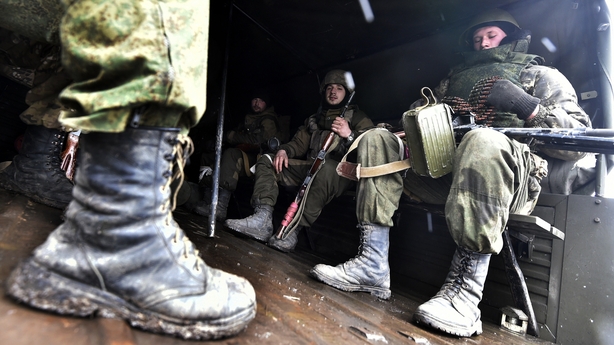US President Barack Obama is still hoping for a diplomatic solution to the Ukrainian conflict.
Mr Obama has not made up his mind about whether to send arms to Ukraine in its battle against Russian-backed rebels in the east of the country.
"The measure by which I make these decisions is: 'Is it more likely to be effective than not?'," Mr Obama said at a news conference in Washington with German Chancellor Angela Merkel, who opposes providing Ukraine with weapons to fight the separatists.
Russia had violated a September peace deal by sending more tanks and artillery into eastern Ukraine, Mr Obama said, adding that he and Ms Merkel had agreed sanctions must stay for now and Moscow's isolation would worsen if it continued on its current course.
Ms Merkel is due to meet Russian President Vladimir Putin and Ukrainian leader Petro Poroshenko tomorrow with French President Francois Hollande in Belarussian capital Minsk.
Moscow earlier warned that Mr Putin will not be spoken to in the language of ultimatums.
Asked about media speculation Ms Merkel had issued him an ultimatum at talks on arranging a summit on Ukraine, Kremlin spokesman Dmitry Peskov said: "Nobody has ever talked to the president in the tone of an ultimatum - and could not do so even if they wanted to."
Mr Obama has to decide whether to supply weapons, impose tougher sanctions on Russia in the hope of forcing Mr Putin to compromise, or throw his full weight behind the revised German-French peace initiative.
He said his decision would not rest on a specific point.
"Can we be certain that any lethal aid that we provide Ukraine is used properly, doesn't fall into the wrong hands, does not lead to over-aggressive actions that can't be sustained by the Ukrainians?
"What kinds of reactions does it prompt, not simply from the separatists but from the Russians? Those are all issues that have to be considered," he said at the White House.
European Union foreign ministers delayed tightening sanctions today to give the talks a chance.
Ms Merkel said that while there had been setbacks on reaching a diplomatic solution, such efforts would continue.
She did not see a military solution to the crisis, she added.
The German leader and Mr Obama have come under fire from US foreign policy hawks in the Republican-controlled Congress who want weapons sent to the Ukraine army.
The US Senate and House unanimously passed legislation in December that authorised sending arms to Ukraine.
Mr Obama signed the measure into law but it gave him leeway over whether or when to implement it.
"The Ukrainians are being slaughtered and we're sending them blankets and meals," Senator John McCain said at a security conference in Munich at the weekend. "Blankets don't do well against Russian tanks."
 Pro-Russian separatists go to the front near Debaltseve
Pro-Russian separatists go to the front near Debaltseve
Nine Ukrainian troops were killed in a 24-hour period over Sunday and seven civilians also died, the Ukraine government said today, with fighting particularly intense around the town of Debaltseve, a major rail and road junction northeast of the key city of Donetsk.
Ms Merkel has taken the lead in pursuing a diplomatic solution, speaking with Mr Putin by phone dozens of times over the past year and meeting him in Russia, Australia and Italy in recent months.
Last week, Ms Merkel and Mr Hollande met Mr Putin in Moscow and followed this up with a conference call on Sunday also including Mr Poroshenko.
But so far no breakthrough has emerged in the nearly year-long conflict that has claimed over 5,000 lives.
EU foreign ministers approved visa bans and asset freezes on more Ukrainian separatists and Russians.
But they will wait until next Monday before imposing the measures to give peace efforts more time, French Foreign Minister Laurent Fabius said.
"The principle of these sanctions remains but the implementation will depend on results on the ground," he said."We will see by Monday and see how the meeting in Minsk went."
Minister for Foreign Affairs, Charlie Flanagan, TD, said: "We have maintained all along that the Ukraine crisis can only be resolved politically.
"I continue to believe that the Minsk agreement provides the basis for a solution to the crisis but a sustainable ceasefire is a key step to making progress.
"Dialogue with Russia and others remains crucial in the pursuit of a settlement that fully respects Ukraine's sovereignty and territorial integrity. It was useful to hear of the ongoing efforts by Chancellor Merkel and President Hollande in that regard.”
Sanctions imposed in stages by the EU and United States since Moscow annexed Crimea from Ukraine last March have badly hurt the Russian economy, adding to problems created by the plunging price of oil, the country's main export.

